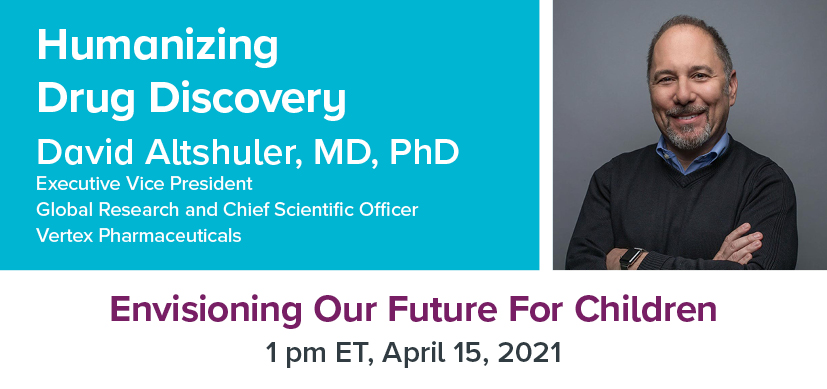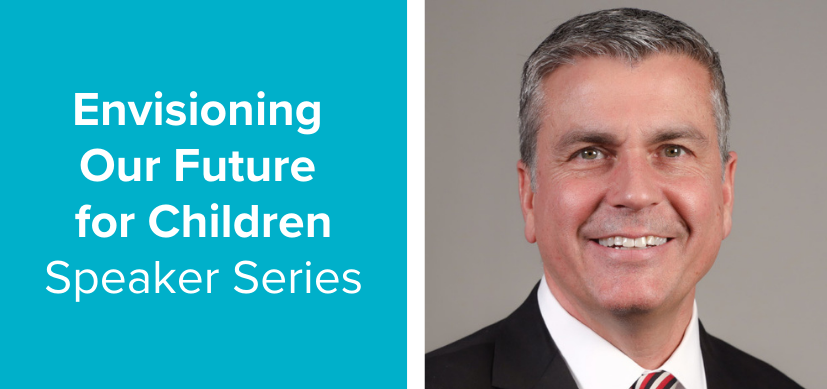Why I’m Optimistic About the Future of Human Health
Post Date: May 3, 2021 | Publish Date:

Prior to joining Vertex Pharmaceuticals, Dr. Altshuler was one of four founding members of the Broad Institute of Harvard and MIT, launched in 2004. At Vertex, Dr. Altshuler helped lead development of a groundbreaking set of treatments that have changed the outcome for many people with cystic fibrosis.
We are honored that Dr. Altshuler joined our Envisioning Our Future For Children speaker series and grateful to be able to share more of his thoughts with the blog article below:
By David Altshuler, MD, PhD
When I was invited to speak at Cincinnati Children’s “Envisioning Our Future For Children” series, I immediately accepted. As a physician-scientist who has spent the last 35 years in academic medicine and now in industry, I believe deeply in the value to society of institutions like Cincinnati Children’s. Organizations that combine medicine, education and science play a unique and essential role in improving the lives of children and families battling serious diseases.
Over the last few decades, our knowledge of the biology of human disease has expanded dramatically. This improved understanding of human disease, coupled with the invention and rapid evolution of new tools and technologies to make therapies, is dramatically accelerating progress in medicine. We now have a significant opportunity to create transformative or curative therapies for inherited diseases such as spinal muscular atrophy, sickle cell disease and cancer, creating tremendous value for patients and society.
At Vertex, human biology and therapeutic innovation are the dual pillars of our R&D strategy – a strategy based on lessons learned from the successes and failures of medicine, and that guides all of our drug discovery programs. For me, this philosophy dates back 35 years to my first day of medical school. We were handed an essay by Francis Weld Peabody in which he wrote: “Disease in man is never exactly the same as disease in an experimental [setting] … One of the essential qualities of the clinician is interest in humanity, for the secret of the care of the patient is in caring for the patient.” Despite being written almost 100 years ago, Peabody’s words remain relevant today. What he means is that to improve the lives of patients, we need to focus on people with disease — what they experience, why they become ill, and how to address the root causes of their suffering. As I discussed during my talk, his patient-focused vision is the bedrock for all medical progress.
Academic medical institutions like Cincinnati Children’s are centrally important to this work. For many years I was an attending physician and professor at Massachusetts General Hospital, where I now serve as a Senior Lecturer and advisor. There is something powerful—even magical—about the combination of basic research, disease biology, clinical investigation and patient care under the same roof. It’s the magic of insight, of spark, of hope.
Imagine a world in which we did all of these activities—clinical care, education, and science—separately. Society might be fine for the next five years. But what happens 10, 15, 20 years down the road, when the next generation of physician-scientists aren’t nourished by the rich stew of investigation, teaching and clinical care? Would doctors emerge who could solve problems such as COVID, that aren’t in the textbooks? Would science be as focused on the problems that remain unsolved for patients? To me, the answer is “no.” Cincinnati Children’s is one of a few dozen places in the country that are the fertile ground for making new discoveries and training the next generation.
At Vertex, we recognize the importance of these great institutions, but we’ve also benefited from them. Our Executive Chairman and our CEO – in addition to myself – are all physician-scientists. We grew up at academic medical centers where we learned how to translate basic scientific discoveries into breakthrough medicines for patients. Today, this mindset is at the heart of how we lead Vertex.
There is perhaps no better example of the power of the biomedical research community than the COVID-19 pandemic. Through a combination of basic science, clinical care, and therapeutic innovation, we collectively discovered and developed COVID-19 treatments and vaccines in less than a year. That is remarkable, and it speaks to the incredible value that academic medicine creates in the form of our innovation ecosystem.
We have a saying at Vertex: drug discovery is the ultimate team sport. And it’s true – it takes thousands of scientists, investigators, clinicians and advocates to bring new medicines to patients and transform human health. Just as Peabody argues we need an interest in humanity to address human suffering, we must also recognize the importance of institutions that make it possible for medical progress to thrive.
At the end of the day, it’s about the people–both the people who pioneer this work, as well as those living with diseases who motivate and inspire us to do it. If we keep them front and center, success will inevitably follow.
WATCH THE VIDEO
Learn more about cystic fibrosis research and care at Cincinnati Children’s
Personalized Cystic Fibrosis Therapy and Research Center
Pancreas-On-A-Chip May Advance Cystic Fibrosis Research
Collaboration Leads to Airway Device
Next up: Noon, June 1, 2021
The Moral Determinants of Health
Donald Berwick, MD, MPP
President Emeritus and Senior Fellow
Founding CEO
Institute for Healthcare Improvement







